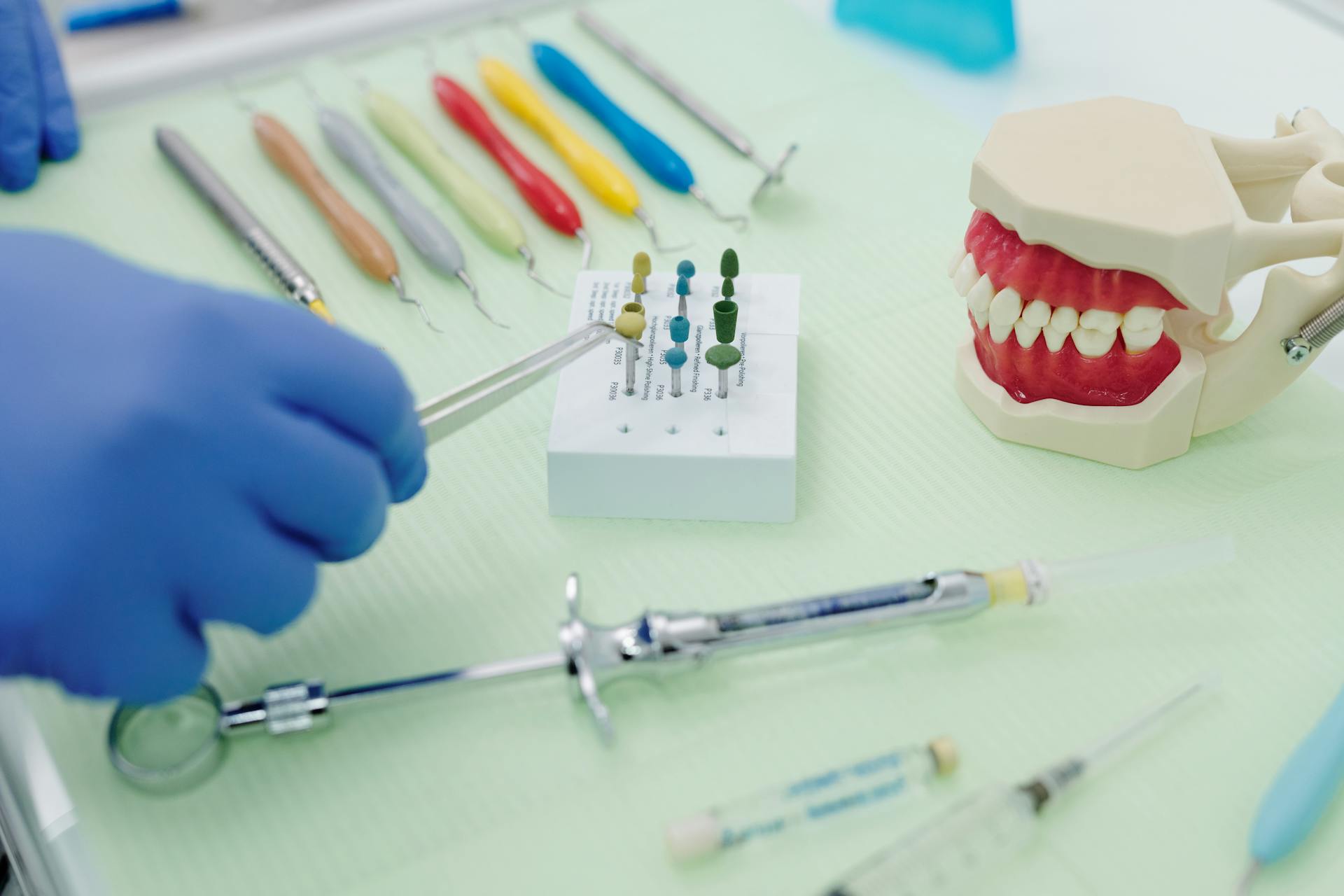
If your pet is experiencing difficulty eating, it may be a sign of masticatory myositis. This condition affects the muscles involved in chewing, making it painful for your pet to eat.
Pain and stiffness in the jaw area are common symptoms of masticatory myositis. Some pets may also exhibit a decrease in appetite due to the discomfort.
Inflammation of the muscles is a hallmark of masticatory myositis, which can cause swelling in the jaw area. This swelling can be tender to the touch.
A veterinarian's examination is essential in diagnosing masticatory myositis, as the symptoms can be similar to other conditions.
Take a look at this: Masticatory Muscle Myositis Dog Head Sunken in above Eye
Symptoms and Diagnosis
Masticatory myositis can be a challenging condition to diagnose, as the symptoms can be vague and easily confused with other conditions.
In the acute phase, symptoms may include lethargy, fever, unwillingness to eat, and drooling. These symptoms can be similar to those of other diseases, making diagnosis tricky.
A thorough examination under anesthesia may be necessary to diagnose masticatory myositis. Your veterinarian may recommend this if a tooth or oral condition was initially suspected, but a thorough oral examination will show that the dog cannot open its jaw even under anesthesia.
For another approach, see: Masticatory Myositis Dogs
Bloodwork may show anemia, an increase in certain white blood cells, and an increase in globulins. These changes can indicate that the dog's immune system is stimulated, which is often seen in diseases that cause inflammation.
Here are some key bloodwork changes that may indicate masticatory myositis:
- Anemia
- Increased neutrophils, leukocytes, and eosinophils
- Increased globulins
- Increased creatine kinase (CK)
- Increased aspartate aminotransferase (AST)
A muscle biopsy is often necessary to confirm the diagnosis and determine the progression of the disease. This test can help your veterinarian understand the extent of muscle damage and fibrous tissue formation.
If your dog is experiencing jaw pain or difficulty opening its mouth, it's essential to have it checked by a veterinarian. Trismus, or painful jaw movement, can be a sign of a more serious underlying condition, such as masticatory myositis.
Veterinary Care
Your veterinarian may suspect masticatory myositis based on a panel of bloodwork that shows anemia, an increase in certain white blood cells, and an increase in globulins.
A thorough oral examination under anesthesia may be recommended if a tooth or oral condition was initially suspected.
A dog with MMM will not be able to have its jaw opened even under anesthesia, which is a key diagnostic clue.
A specific blood test called a 2M antibody ELISA assay can help diagnose masticatory muscle myositis by detecting circulating autoantibodies to the 2M fibers.
However, this test should be done before treatment is initiated, as steroids can interfere with the test results.
A muscle biopsy is needed to determine the progression of the disease and subsequent prognosis, and it's typically done in conjunction with the 2M antibody test.
Here are the key bloodwork results that may indicate masticatory myositis:
- Anemia
- Increased neutrophils, leukocytes, and eosinophils
- Increased globulins
- Increased creatine kinase (CK)
- Increased aspartate aminotransferase (AST)
Treatment and Recovery
Dogs with masticatory myositis may need a course of therapy that can last weeks to months or even a lifetime.
The goal of treatment is to aggressively halt the immune system's attack on the muscle and return the dog to normal as quickly as possible.
Most dogs need to be on medication for at least 30 days before the dose can be tapered.
Prednisone or prednisolone is usually the drug of choice, but other immunosuppressive drugs like azathioprine or cyclosporine may be prescribed to help combat inflammation.
Your dog may need other pain medications until the steroids reduce inflammation and circulating antibodies.
You can expect medications to take a few weeks to work before your dog feels better and shows some improvement.
Masticatory myositis can be a recurrent condition, and it can be more difficult to treat each time.
Inappropriate doses of immunosuppressive medications, or an inappropriate length of time the medications are prescribed or given to the dog, can lead to a relapse.
It's essential to give all medications as prescribed and work closely with your veterinarian to ensure the best possible outcome.
Successful feeding may require softening dry food with warm water or canned food or blending it into a gruel to lap up or syringe feed, if necessary.
Calorie-dense liquid formulations may also be prescribed by your vet to help your dog gain weight.
Dogs with masticatory myositis may need to be on medication for at least 6 months after the dosage is tapered.
Recommended read: Common Food Allergies Dogs
Muscle and Jaw Issues
Masticatory myositis can cause a range of muscle and jaw issues in dogs. Dogs with this condition often exhibit painful swelling of the temporalis and masseter muscles, which can lead to muscle atrophy and fibrosis. This can result in a dog's inability to open its mouth, as the chronic inflammation impedes full opening of the jaw.
The diagnosis of masticatory myositis is based on clinical signs, such as fever, painful swelling of the temporalis and masseter muscles, and lymphadenopathy. A complete blood count may reveal a mild nonregenerative anemia and a neutrophilic leukocytosis, while a chemistry panel may show an increase in creatine kinase (CK), AST, and globulins. Autoantibodies against 2M muscle fibers are seen in 85-90% of dogs with the acute phase, but may not be present in dogs with the chronic phase.
Dogs with masticatory myositis may also experience other symptoms, such as difficulty eating or dropping food or toys, or jerking their head back when trying to yawn or chew on something firm. If left untreated, the condition can lead to permanent damage to the muscles and jaw. However, with early and accurate diagnosis, and appropriate treatment, the prognosis is good, and many dogs can be successfully treated with immunosuppressive therapy.
Broaden your view: Chronic Superficial Keratitis
Muscle
Muscle issues in dogs can manifest in various ways, but one common symptom is difficulty opening the mouth. This can be due to a condition called masticatory muscle myositis, which affects the muscles used for chewing. Masticatory muscle myositis is an immune-mediated disorder that causes pain and swelling in the temporalis and masseter muscles.
Dogs with this condition may exhibit fever, painful swelling, and lymphadenopathy. Palpation of the affected muscles can lead to pain and difficulty opening the mouth. If left untreated, the disease can progress to muscle atrophy and fibrosis, leading to permanent damage.
Some breeds, such as German Shepherds, Retrievers, and Doberman Pinschers, are overrepresented in cases of masticatory muscle myositis. The condition is typically seen in young or middle-aged dogs, but can also occur in puppies as young as 3 months.
Treatment for masticatory muscle myositis involves immunosuppressive therapy, usually with prednisone at doses of 2-4mg/kg/day. The goal is to reduce pain and inflammation, and improve jaw mobility. In some cases, additional immunosuppressive drugs may be necessary to manage the condition.
Here are some common causes of trismus (difficulty opening the mouth) in dogs:
- Masticatory myositis
- Polymyositis
- Muscular dystrophy
- Tumors of the chewing muscles
These conditions can cause muscle swelling, atrophy, and pain, leading to difficulty opening the mouth. Early diagnosis and treatment are crucial to prevent permanent damage and improve prognosis.
If your dog is experiencing difficulty opening its mouth, it's essential to consult a veterinary dentist or a veterinarian to determine the underlying cause. They can perform a physical examination, take a complete blood count, and run diagnostic tests to determine the cause of the trismus.
See what others are reading: Can Allergies Cause Swollen Lymph Nodes in Dogs
Other Conditions That Can Be Mistaken for
If you're experiencing muscle and jaw issues, it's essential to consider other conditions that can be mistaken for Masticatory Muscle Myositis (MMM). Atrophy of the masticatory muscles can occur as a result of chronic corticosteroid therapy, so it's crucial to rule out this possibility.
Chronic corticosteroid therapy can cause significant atrophy of the masticatory muscles, making it a potential misdiagnosis for MMM. This is because the masticatory muscles are very sensitive to the effects of corticosteroids.
Disorders of the temporomandibular joints should also be ruled out with radiographic evaluation, as they can cause similar symptoms to MMM. Atrophy of the masticatory muscles and muscle pain may also occur in endocrine disorders, including hypothyroidism and Cushing's syndrome.
The 2M antibody assay in all these conditions would be negative, which can help distinguish them from MMM.
Frequently Asked Questions
Can masticatory myositis be cured?
Early detection and treatment can lead to successful recovery from masticatory muscle myositis in dogs. However, managing the disease can be challenging and requires close veterinary care.
Is myositis painful for dogs?
Yes, myositis can be painful for dogs, causing swelling and discomfort in the affected muscles. If your dog is experiencing pain or stiffness while chewing, it may be a sign of this condition.
Sources
- https://www.wellpets.com/blog/160-my-dog-has-pain-or-difficulty-opening-its-mouth/
- https://www.purinaproclub.com/resources/dog-articles/health/early-diagnosis-of-masticatory-muscle-myositis-is-needed-for-treatment-success
- https://www.petmd.com/dog/conditions/immune/masticatory-myositis-dogs
- https://vetneuromuscular.ucsd.edu/cases/2010/January.html
- https://www.mspca.org/angell_services/masticatory-muscle-myositis/
Featured Images: pexels.com

